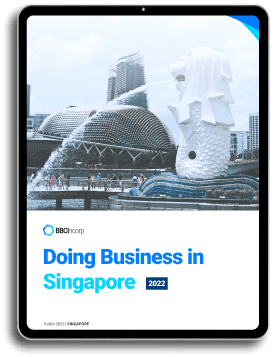
Are you an entrepreneur with a newly-establish company and wishing to hire new talents? In this case, you really should get familiar with the Singapore Employment Act so that you can make valid contracts and not to violate the work-right regulations as an employer.
There also are other levies and duties that you have to deal with when hiring in Singapore. Let’s see what they are and ultimately take some advice on good employment practices.
1. Knowing The Employment Act
The very first thing you need to do is getting familiar with the Employment Act in Singapore
1.1. Why Should an Employer Know the Employment Act in Singapore?
In short, The Employment Act is the main labor law in Singapore. It lays down the basic terms and conditions for employment under a contract of service in the relationship between employers and employees.
In fact, the relationship between the two parties (employer and employees) is mainly regulated in the contract signed after negotiation, but still it must comply with the regulations in the Employment Act. It means that employers have to draw out terms and conditions that at least meet those stated in the Act, if the employees are covered under this Act. That’s why it is necessary and important for you, as an employer, to know the Employment Act in Singapore.
Then what is a contract of service? Keep reading!
1.2. Contract of Service (versus Contract for Service)
There are two kinds of agreements that you should know. They are “contract of service”, which is covered by the Employment Act and “contract for service”, which is not. So the first crucial thing you need to know is how to generally distinguish them two. For better understanding, below are the two brief definitions according to Ministry Of Manpower (MOM) and the brief comparison table:
- A contract of service is an agreement in which:
- One person agrees to hire the other as an employee
- The other agrees to be employed as an employee
- A contract for service is the one in which an independent contractor agrees to carry out a project or assignment for a fee from a client.
| Contract of Service | Contract for Service |
|---|---|
| Employer and Employee relationship | Contractor-client relationship |
| Employee does business for employer | Contractor does business on their own account |
| Regulated by terms and conditions in the Employment Act | Not covered by the Employment Act |
Other factors to be considered, in order to identify the type of contract, are many among control power, ownership of production and other economic considerations. To see more detail on the differences, click here.
1.3. Some Key Changes in The Amendment in 2019
Since the workforce in Singapore has recently been significantly rising, especially managers and executives, the Ministry of Manpower (MOM) along with their partners have reviewed and made an amendment to the Employment Act in 2019. There are main changes (which have taken effect from 1st April 2019) that you, either an employee or an employer, should bear in mind:
| Before 1st April 2019 | After 1st April 2019 |
|---|---|
| Core Provisions did not cover Managers and Executives (M&Es) earning more than $4,500 | Core Provisions now covers all employees, including M&Es, workmen and non-workmen (except seamen, domestic workers and government staff) |
| Non-workmen earning no more than $2,500 received additional protections in Part IV, with overtime rate payable capped at the salary level of $2,250 | Non-workmen earning no more than $2,600 received additional protections in Part IV, with overtime rate payable capped at the salary level of $2,600 |
| Only medical certificates issued by Government or company-approved doctors and dentists are recognized for granting paid sick leave | All medical certificates issued by doctors/dentists registered under the Medical/Dental Registration Act are recognized for granting paid sick leave |
| Wrongful dismissal claims heard by MOM | Wrongful dismissal claims will be heard by the Employment Claims Tribunals |
| Salary deductions can only be made by employers for specific reasons under the Employment Act | Employers can also deduct employers’ salary in the following cases: The employer receives a written consent from the employee; and Enable the employer to withdraw their consent anytime without penalty. |
| Employers can offer time-off to M&Es who earns up to $4,500/month for work on public holiday | Time-off for work on public holidays can be offered to all M&Es, workmen (earning more than $4,500/month), and non-workmen (earning above $2,600/month) |
For an overview of the Employment Act in Singapore and for detail of the common work-rights and duties regulated in it, on which you should have a check in order to make a valid contract and not violate them rules, see our blog about Employment Act in Singapore (Last Updated 2019).
2. Other Aspects That an Employer Need To Know When Hiring
Below are some of the things you need to bear in mind when hiring:
2.1. Key Employment Terms
A good employment practice always starts with the issuing of Key Employment Terms (KETs), and an employer takes responsibility for this task. According to MOM, some items/information must be included in the contract:
- Full name of employer and employee;
- Job title, main duties and responsibilities;
- Probation period or Duration of employment and Date of commencement;
- Working arrangement (working hours, working days per week, rest day, overtime hours if applicable, etc.);
- Salary details: including allowances, deductions, overtime payment if applicable, bonuses and incentives if applicable, etc.;
- Types of leave: annual leave, sick leave, maternity leave and childcare leave, etc.;
- Termination notice period;
- Other medical benefits: insurance, medical and dental benefits, etc.
Employers must issue KETs in writing (soft copy or hard copy) to all employees within 14 days after the date of commencement (the starting date of employment). For example, if your employee starts work on 1 January, you must issue the KETs by 15 January.
2.2. Reporting Employees’ Earning
As an employer, you must prepare and submit tax forms to declare remuneration of all of your employees by 1st March every year.
From Year of Assessment (YA) 2020, it is compulsory for employers with 7 or more employees for the whole year ending 31st December 2019 or who have received the “Notice to File Employment Income Of Employees Electronically” to participate in the Auto-Inclusion Scheme (AIS) for Employment Income. Under AIS, employers submit the employees’ income information to IRAS electronically. The submitted information will be automatically included in the employees’ income tax assessment.
2.3. Central Provident Fund (CPF)
If your employees are Singapore Citizens or Permanent Residents, then it is mandatory for them to contribute to the CPF. Employers are required to pay both the employer and employees’ contributions every month, at the maximum rates of 17% and 20% of wages respectively. The rates will gradually decline over the time periods.
2.4. Foreign Worker Levy
Foreign employees or Work Permit holders are not the target of the above CPF. However, an employer must pay a monthly foreign worker levy for them. It is a pricing mechanism to regulate the number of foreign workers in Singapore. The amount has to be paid will depend on the worker’s qualifications and the proportion of foreign workers to the total workforce that a company in a given sector can employ.
2.5. Skills Development Levy (SDL)
Apart from CPF and Foreign Worker Levy, you as an employer have to pay the Skills Development Levy (SDL) for all of your employees. This levy will be transferred to Skills Development Fund, which supports workforce upgrading programs and training grants to employers under National Continuing Education Training system.
For the first $4,500 of an employee’s total monthly wage, the payable amount is at the rate of 0.25% or $2, whichever is higher. For more than $4,500, the payable amount is fixed at $11.25.
2.6. Legal Age to Work in Singapore
People from the age of 16 can legally work in Singapore, and those who are below 13 years old are illegally to do so. However, according to the Employment Act, employers can still employ a child (from 13 to under 15 years old) or a young person (15 to under 16 years old), but only in the following cases:
- A child may be employed in an industrial entity in which only members of the family are employed;
- A child or a young person may be employed in light work suited to his capacity in a non-industrial entity, only with an approved medical certificate;
- A young person may be employed in an industrial enterprise but the employer must send notification and medical certificate to MOM;
Employers who violate the provision for child and young person employment are subject to a fine up to $5,000 or imprisonment to 2 years or even both.
All in all, the minimum age to be hired for work in Singapore is 13 years old, but only in extremely limited circumstances. And the maximum age to be hired is 67 years old.
3. Advice to Employers on Good Employment Practices
According to MOM, it is better to implement fair employment practices, involving merit-based and against discrimination, due to the fact that Singapore workforce is multi-cultural.
3.1. Reasons For Fair Employment Practices
- You allow yourself to access to a wider pool of talents such as older experienced workers and women workforce or even overseas professionals;
- By using merit-based method to evaluate the productivity of employees, you can make sure that the best employees got the jobs;
- A diversity of employees will have you get more insights into customers and market segments;
- Businesses that gain a reputation for embracing fair employment practices will find it easier to attract and recruit employees.
3.2. Guiding Principles
According to the Tripartite Alliance for Fair and Progressive Employment Practices (TAFEP), as an employer, you should take consideration into these following principles:
- Recruit and choose suitable candidates depending on the basis of merit (skills, qualifications, experience, etc.) rather than gender, age, religion, race, etc.;
- Provide equal opportunities for training and development and reward fairly on the results and performances to all employees;
- Treat all employees equally and with respect;
- Abide by labour laws and adopt the Tripartite Guidelines on Fair Employment Practices.
4. Conclusion
Above are the things you should bear in mind when hiring in Singapore. As long as you can meet the regulations in the Employment Act, you are good to discuss with your employees and mention further agreements on terms and conditions in the contract.
Should you need any advice on the employment or on company formation in Singapore, feel free to contact us! We provide top-notch Business-Establishment Services and Work Pass as well.
Disclaimer
While BBCIncorp strives to make the information on this website as timely and accurate as possible, the information itself is for reference purposes only. BBCIncorp would like to inform readers that we make no representation or warranty, express or implied. Feel free to contact BCCIncorp’s customer services for advice on specific cases.
Get helpful tips and info from our newsletter!
Stay in the know and be empowered with our strategic how-tos, resources, and guidelines.


